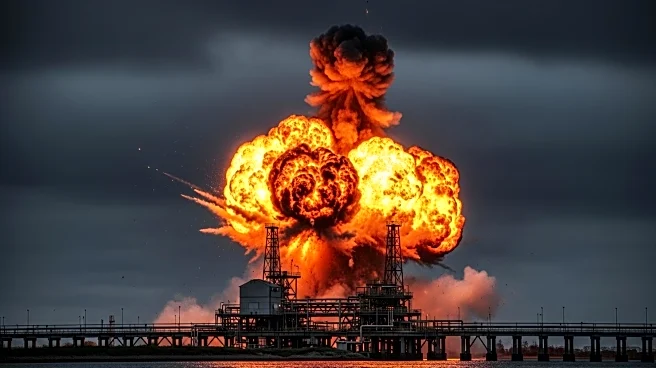What's Happening?
Ukraine has launched a significant drone attack on Russia's largest oil terminal, the port of Primorsk, marking the first time this key facility has been forced to suspend operations. The attack, which occurred overnight, set fire to two tankers, including one capable of carrying 700,000 barrels of oil. This move is part of Ukraine's strategy to target Russia's crude oil production terminals and vessels, aiming to cut off the Kremlin from its primary revenue source. The attack comes amidst a pause in peace negotiations between Russia and Ukraine, with the Kremlin accusing European interference in the talks. Additionally, Russia claims to have intercepted 221 Ukrainian drones overnight, while a Russian glide bomb killed two civilians in Ukraine's Sumy region.
Why It's Important?
The attack on the Primorsk port is a significant escalation in the ongoing conflict between Ukraine and Russia, with potential implications for global oil markets. The suspension of operations at a major oil terminal could lead to fluctuations in oil prices, as evidenced by the immediate rise in US West Texas Intermediate crude prices. This disruption in Russia's oil exports could pressure the Kremlin economically, potentially influencing the dynamics of the conflict. The targeting of energy infrastructure highlights the strategic importance of oil in the geopolitical landscape, affecting not only the involved nations but also global stakeholders reliant on stable energy supplies.
What's Next?
The immediate aftermath of the attack has seen a surge in oil prices, and further disruptions could exacerbate this trend. The international community, particularly countries dependent on Russian oil, may need to reassess their energy strategies. The pause in peace negotiations suggests a potential stalemate, with both sides possibly seeking alternative means to gain leverage. The situation may prompt increased diplomatic efforts to resume talks, while military strategies on both sides could evolve in response to the changing dynamics.
Beyond the Headlines
The attack underscores the vulnerability of critical infrastructure in conflict zones and raises questions about the security of global energy supplies. It also highlights the ethical and legal challenges of targeting civilian infrastructure in warfare. The broader implications for international law and the rules of engagement in conflicts involving state and non-state actors could be significant, potentially influencing future military and diplomatic strategies.










